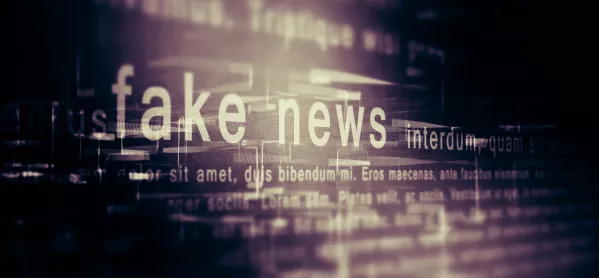Media studies should be made mandatory in schools to prevent young people being taken in by fake news and disinformation, a research project has recommended.
The project, led by the Centre for Excellence in Media Practice at Bournemouth University and funded by the US Embassy in London, looked into the problem of how to help children and young people tell whether what they read online is real or fake.
Quick read: Pupils ‘lack literacy skills to spot fake news’
Opinion: ‘I worry about the depersonalising effect of screens’
Flagship schools: ‘The Edtech 50 demonstrates the power of edtech to support learners’
And it concluded that the most effective educational response would be to make media studies a mandatory school subject.
The research was based on a review of articles and reports on media literacy and fake news, and interviews and workshops with media educators, journalists, students and information professionals.
How to spot fake news
“It’s pretty clear that if every child studied media in school, we would have a more critical, resilient generation of citizens who would be much less vulnerable to fake news,” said Professor Julian McDougall, a professor in media and education at Bournemouth University, who led the project.
He added that the key finding was that fact-checking tools and online media literacy resources helped young people to become more resilient to fake news. But in the long-term a better approach, he said, would be sustained media literacy provision in schools.
The researchers also recommended a critical study of social media algorithms, and said that “big data” should be added to the media education curriculum.
“In educational, political, media and policy discourse, concerns about fake news and misinformation are widespread,” added Professor McDougall.
“A plethora of initiatives, policies, projects, toolkits and online resources pose the question - what can we do about this pressing societal challenge before it becomes a crisis, if it hasn’t already, with the potential to be as threatening to our democracies as climate change is to our environment?
“But the answer is right there, right now, in most of our schools, but only for the minority of young people who choose media studies as an option. For a number of reasons, all of the influential ‘stakeholders’ in young people’s education are ignoring it or looking for answers elsewhere.”
The Department for Education has been contacted for comment.




